综合商务英语
- 格式:pdf
- 大小:233.85 KB
- 文档页数:4
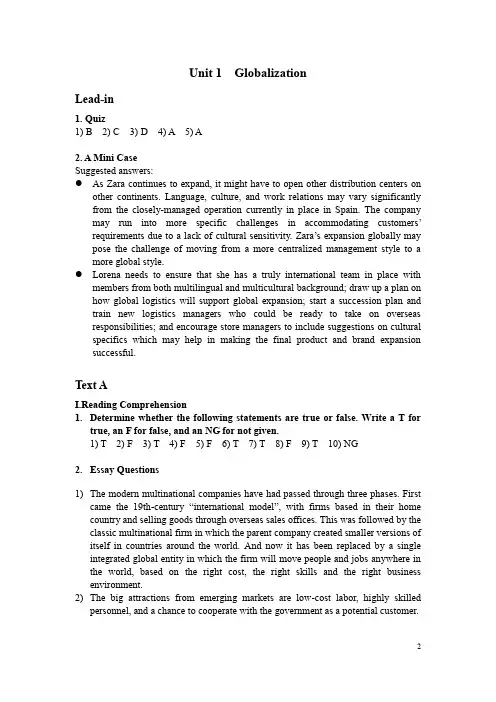
Unit 1 GlobalizationLead-in1. Quiz1) B 2) C 3) D 4) A 5) A2. A Mini CaseSuggested answers:●As Zara continues to expand, it might have to open other distribution centers onother continents. Language, culture, and work relations may vary significantly from the closely-managed operation currently in place in Spain. The company may run into more specific challenges in accommodating customers‘requirements due to a lack of cultural sensitivity. Zara‘s expansion globally may pose the challenge of moving from a more centralized management style to a more global style.●Lorena needs to ensure that she has a truly international team in place withmembers from both multilingual and multicultural background; draw up a plan on how global logistics will support global expansion; start a succession plan and train new logistics managers who could be ready to take on overseas responsibilities; and encourage store managers to include suggestions on cultural specifics which may help in making the final product and brand expansion successful.Text AI.Reading Comprehension1.Determine whether the following statements are true or false. Write a T fortrue, an F for false, and an NG for not given.1) T 2) F 3) T 4) F 5) F 6) T 7) T 8) F 9) T 10) NG2.Essay Questions1)The modern multinational companies have had passed through three phases. Firstcame the 19th-century ―international model‖, with firms based in their home country and selling goods through overseas sales offices. This was followed by the classic multinational firm in which the parent company created smaller versions of itself in countries around the world. And now it has been replaced by a single integrated global entity in which the firm will move people and jobs anywhere in the world, based on the right cost, the right skills and the right business environment.2)The big attractions from emerging markets are low-cost labor, highly skilledpersonnel, and a chance to cooperate with the government as a potential customer.3)They are lacking the management talents who can practice and support businessoperating models that will allow them to generate profitable growth in more mature markets over the long term.4)The single biggest challenge facing Western multinationals is the lack ofemerging-market experience in their senior ranks. Moreover, multinationals have great trouble retaining the managers they do have in emerging markets.―Well-trained, good, honest people are scarce in emerging markets. Multinationals are better at training these people than emerging-market companies, which prefer to poach them once they are trained.‖II.Blank-filling: Complete the following sentences with the words given in the box. Change the form when necessary.1) cutting-edge 2) commoditized 3) aggressive 4) forge 5) benchmark 6) blueprint 7) expatriates 8) deploy 9) ferocious 10) substantial III.Paraphrasing1.Rewriting: Rewrite the underlined part of each sentence in your own words.1) ―In the 97 years of the company‘s history, never had a particular kind of product or merchandise been managed outside the U.S.,‖he says excitedly, noting that ―Latin America now reports to Shanghai.‖2) But the assault on its services business led by a trio of Indian outsourcing upstarts, Tata Consulting Services, Infosys and Wipro, posed a big threat to the field that might be the main sources of growth for the company as expected by Mr. Palmisano.3) In many emerging markets the most attractive potential customer is the government, because of the government‘s urgent needs to improve the infrastructure facilities in a wide range, from the mobile telephone networks to roads, airports and ports, energy and water supply.4) A 2007 study of China‘s top 200 publicly traded companies found that it is still difficult even for the leading companies in China to compete with those global giants.5) American multinationals now have a ―ferocious interest in attracting non-Americans to the board‖, but they can find only a few qualified executives from the European countries, not to mention those from emerging markets.2. Sentence Transformation: Complete the following sentences based on the structures given.1) Because of the fact that hot labor markets in emerging markets are causing extremely high turnover rates, every big multinational is aiming to win the ―war for talent‖ and taking it as one of the most urgent issues.2) It is believed that as a big multinational company it enjoys advantages in recruiting and retaining talented managers than the local competitors.3) Despite the growth of their revenue which increased on the back of China‘s continued economic growth, they could only create half of the value of their global competitors.4) No longer the ―young bucks or retirement-posing types‖as they used to be,nowadays the expatriate managers appointed by multinationals to work in emerging markets are generally of a much higher quality.5) Compared with those old multinationals, the firms in emerging markets are typically lacking the depth of management talent, though the founders are often impressive.IV.Translation1.Sentence Translation1) 这一雄心勃勃的策略是对来自新兴市场的激烈竞争做出的回应。

综合商务英语3Paraphrase1.1 For twenty minutes,the terminal area was aswarm with activity as cars and lorries poured forth,customs people did their duties,and everyone made for the London road.P:The ferry port was busy with activities for twenty minutes.A lot of cars and lorries went in continuous stream out of the port,customs officers were busy doing their duties,and everybody was moving towards the London road.1.2 I was socially and sartorially ill-suited for such an establishment and anyway it was clearly beyond my meager budget.P:The Churchill is such a luxurious hotel that it is only suitable for those rich people who are socially respectable and well dressed.For me,a poor man not well dressed,it is definitely not suitable.Besides I did not have much money to spend and could not afford it any way.1.3 Further along Marine Parade stood a shelter,open to the elements but roofed,and I decided that this was as good as I was going to get.P:In the distance on the Marine Parade I found a structure with a roof although it was exposed to natural forces.I decided that it could serve my purpose and would be as good as a room ina guesthouse.1.4 The bench was slatted and hard and studded with big roundheaded bolts that made reclining in comfort an impossibility-doubtless their intention.P:The bench was made of thin pieces of wood and thus very hard to sleep on.Besides it was decorated with big roundheaded bolts.Therefore it was impossible to lie on it in a comfortable way.There is no doubt that the bench was designed in this way on purpose.1.5 Afterwards,feeling a new man,I emerged with a toothpick and a burp,and sauntered happily through the streets,watching Dover come to life.It must be said that Dover was not vastly improved by daylight,but I likes it.P:After the breakfast I felt like a new man and walked out of the cafe with a toothpick in my mouth and burped.I wandered on the street leisurely and happily,seeing Dover become more lively.I had to admit that Dover did not become a more attractive town during the daytime but anyway I liked it.2.1 Never mind the popular palaver about marriage as a source of bliss for the couple,security for the kids and societal stability.P:You don’t need to worry about what others say aboutmarriage,for example,a large number of people say that married people can be very happy,their children can be protected and society can be stable if more people get married.But this is just nonsense if the practical aspect of marriage is not taken into account.2.2 Marriage is criticized as a source of stress(and it is),conflict(that to)and endless crises that need to be resolved(guilty there as well).P:There are also negative opinions on marriage,for example,marriage can cause stress,conflict and crises.All these criticisms are correct and you have to solve these marriage-related problems.2.3 Depression and other emotional ills are less likely to go undiagnosed if there’s someone at home who’s mindful of your moods and notices if they darken.P:After getting married,your spouse will be careful of your feelings and sensitive to the changes in your emotions.If you have any symptom of depression or other emotional ills,your spouse will notice it immediately.2.4 The daily stresses of the modern world can throw our bodies into emergency mode and keep us there.That takes a toll through high blood pressure,tension headaches and a lotagain—when a wet towel has once again been dropped on the floor or a tube of toothpaste has been squeezed all wrong—we may lose light of that happy fact.P:4.1 But to their surprise,many people find that enduring such a harrowing ordeal ultimately changes them for the better.P:People feel surprised that they finally have become better persons after undergoing such severely distressful experience.4.2 We love to hear the stories of people who have been transformed by their tribulations,perhaps because they testify to a bona fide psychological truth,one that sometimes gets lost amid endless reports of disaster:There is a built-in human capacity to flourish under the most difficult circumstances. P:We like to hear stories of how serious trouble might competely change people,because these stories really prove a psychological truth that is often neglected by people when facing a disaster,i,e.human beings have an inborn quality that can be fully displayed only in the most difficult situation.4.3 She never anticipated what would happen:a withdrawal reaction that eventually left her in total body agony andneurological meltdown.P:She never expected that stopping medication could finally lead to severe physical pains and neurological problems.4.4 But this time,she was way past her limits,and nothing her doctors did seemed to help.P:But this time it was more than she could bear,and all that the doctors did ended in vain.4.5 She was still in agony,but a new consciousness grew stronger each night:an awesome sense of liberation,combined with an all-encompassing feeling of sympathy and compassion.”I felt stripped of everything I’d ever identified myself with,”she said six mothers later.P:She was still suffering from the severe pain,but she began to have a new feeling about life which was becoming increasingly stronger each day:an amazing feeling of freedom from pain,together with tolerance and sympathy.”I felt th at everything I used to define muself is deprived now.”She said six mouths later.4.6 In that moment,our sense of invulnerability is pierced,and the self-protective mental armor that normally stands between us and our perceptions of the world is torn away.P:At that moment,we realize we are weak and vulnerable,andthe spiritual power that we possess as a means of self-protection when we are looking at this world is taken away.4.7 They cycle through the same sequence of sensations as do trauma survivors:self-loss,confusion and,finally,a new sense of mastery.P:They go through the same course of feeling like those who have experience the emotional shock:feeling at a loss,and finally,gaining the new power.5.1 They have to be heroic violations of the norms and practices that now govern moviemaking everywhere in the world.P:In order to maintain the high artistic level,good films must openly go against the Hollywood system that dominates the production and distribution of films around the world.5.2 Cinema,once heralded as the art of the twentieth century,seems now,as the century closes,to be a decadent art. P:The appearance of films at the beginning of the twentieth century was once regarded as a promising new art,however,at the end of century,films seem to fall to a lower and worse level.5.3 To be kidnapped,you have to be in a movie theater,seated in the dark among anonymous strangers.P:For a person to become overwhelmed by the power of films,he or she has to be physically present in a movie theater,surrounded by unknown people.5.4 With the coming of sound,the image-making lost much of its brilliance and poetry,and commercial standards tightened. P:After the apperance of sound,the artistic level and poetic beauty of films declined.Meanwhile the Hollywood system that governs filmmaking industry became more strict.5.5 Now the balance has tipped decisively in favor of cinema as an industry.P:In the century-long conflict between cinema as an art and cinema as an industry,the current development of filmmaking has unquestionably favored the latter.5.6 The catastrophic rise in production costs in the 1980s secured the worldwide reimposition of industry standards of making and distributing films on a far more coercive and global scale.P:The disadtrous rise in production costs helped to spread and reinforce the commercial standards of moviemaking around the world.5.7 If cinema can be resurrected,it will only be through the birth of a new kind of cine-love.P:The only way to revive the golden age of cinema is by cultivating a new kind of love of cinema among the audience.Translation1.1远处松林覆盖的群山沐浴在一种不知来自何处的略带绿色的紫光里。
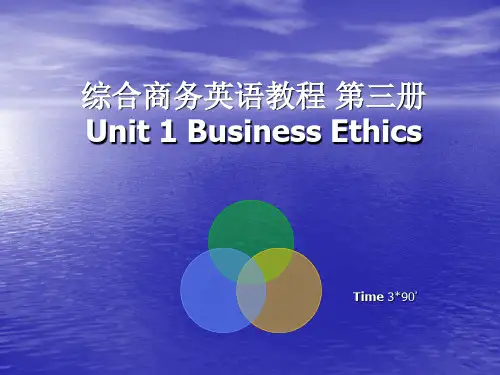
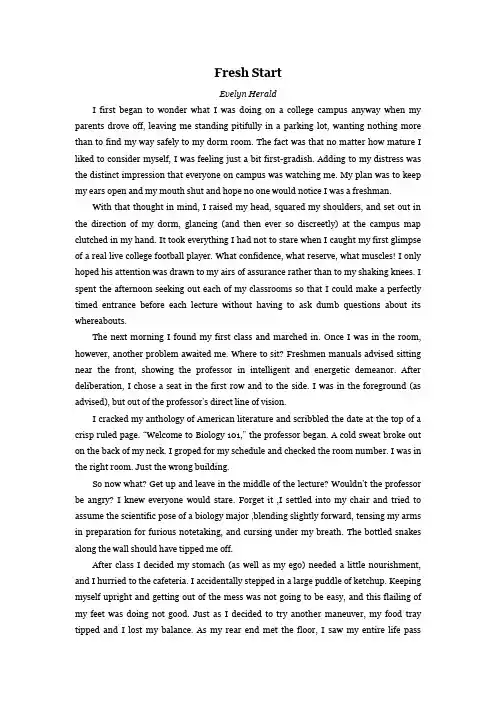
Fresh StartEvelyn HeraldI first began to wonder what I was doing on a college campus anyway when my parents drove off, leaving me standing pitifully in a parking lot, wanting nothing more than to find my way safely to my dorm room. The fact was that no matter how mature I liked to consider myself, I was feeling just a bit first-gradish. Adding to my distress was the distinct impression that everyone on campus was watching me. My plan was to keep my ears open and my mouth shut and hope no one would notice I was a freshman.With that thought in mind, I raised my head, squared my shoulders, and set out in the direction of my dorm, glancing (and then ever so discreetly) at the campus map clutched in my hand. It took everything I had not to stare when I caught my first glimpse of a real live college football player. What confidence, what reserve, what muscles! I only hoped his attention was drawn to my airs of assurance rather than to my shaking knees. I spent the afternoon seeking out each of my classrooms so that I could make a perfectly timed entrance before each lecture without having to ask dumb questions about its whereabouts.The next morning I found my first class and marched in. Once I was in the room, however, another problem awaited me. Where to sit? Freshmen manuals advised sitting near the front, showing the professor in intelligent and energetic demeanor. After deliberation, I chose a seat in the first row and to the side. I was in the foreground (as advised), but out of the professor’s direct line o f vision.I cracked my anthology of American literature and scribbled the date at the top of a crisp ruled page. “Welcome to Biology 101,” the professor began. A cold sweat broke out on the back of my neck. I groped for my schedule and checked the room number. I was in the right room. Just the wrong building.So now what? Get up and leave in the middle of the lecture? Wouldn’t the professor be angry? I knew everyone would stare. Forget it ,I settled into my chair and tried to assume the scientific pose of a biology major ,blending slightly forward, tensing my arms in preparation for furious notetaking, and cursing under my breath. The bottled snakes along the wall should have tipped me off.After class I decided my stomach (as well as my ego) needed a little nourishment, and I hurried to the cafeteria. I accidentally stepped in a large puddle of ketchup. Keeping myself upright and getting out of the mess was not going to be easy, and this flailing of my feet was doing not good. Just as I decided to try another maneuver, my food tray tipped and I lost my balance. As my rear end met the floor, I saw my entire life passbefore my eyes: it ended with my first day of college classes.In the seconds after my fall I thought how nice it would be if no one had noticed. But as all the students in the cafeteria came to their feet, table by table, cheering and clapping, I knew they had not only noticed ,they were determined that I would never forget it. Slowly I kicked off my ketchup-soaked sandals and jumped clear of the toppled tray and spilled food. A cleanup brigade came charging out of the kitchen, mops in the hand. I sneaked out of the cafeteria as the cheers died down behind me.For three days I dined alone on nothing more than humiliation, shame, and an assortment of junk food from a machine strategically placed outside my room. On the fourth day I couldn’t take another crunchy-chewy-saltly-sweet bite. I needed some real food. Perhaps three days was long enough for the campus population to have forgotten me. So off to the cafeteria I went.I made my way through the food line and tiptoed to a table, where I collapsed in relief. Suddenly I heard a crash that sounded vaguely familiar. I looked up to see that another poor soul had met the fate I’d thought was rese rved only for me. I was even more surprised when I saw who the poor soul was: the very composed, very upper class football player I’d seen just days before (thought he didn’t look quite so composed wearing spaghetti on the front of his shirt). My heart went out to him as people began to cheer and clap as they had for me. He got up, hands held high above his head in a victory clasp , grinning from ear to ear. I expected him to slink out of the cafeteria as I had, but instead he turned around and began prepar ing another tray. And that’s when I realized I had been taking myself far too seriously.What I had interpreted as a malicious attempt to embarrass a naïve freshman had been merely a moment of college fun. Probably everyone in the cafeteria had done something equally dumb when he or she was a freshman-and had lived to tell about it.Who cared whether I dropped a tray, where I sat in class, or even whether I showed up in the wrong lecture? Nobody. This wasn’t like high school. Popularity was not so important: running with the crowd was no longer a law of survival. In college, it didn’t matter. This was my bid chance to do my own thing, be my own woman-if I could get past my preoccupation with doing everything perfectly.Once I recognized that I had no one’s expectations to live up to but my own, I relaxed. The shackles of self-consciousness fell away, and I began to view college as a wonderful experiment. I tried on new experiences like articles of clothing, checking their fit and judging their worth. I broke a few rules to test my conscience. I dressed a little differently until I found the Real Me. I discovered a taste for jazz, and I decided I like goingbarefoot .I gave up trying to act my way through college (this wasn’t drama school) and beg an not acting at all. College, I decided, was probably the only time I would be completely forgiven for massive mistake (including stepping in puddles of ketchup and dropping food trays). So I used the opportunity to make all the ones I thought I’d never m ake.Three years after graduation, I’m still making mistakes. And I’m even being forgiven for a few.。
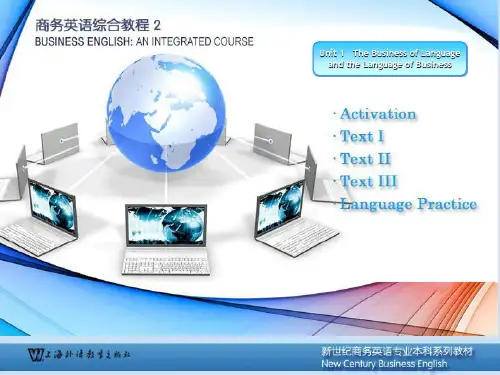
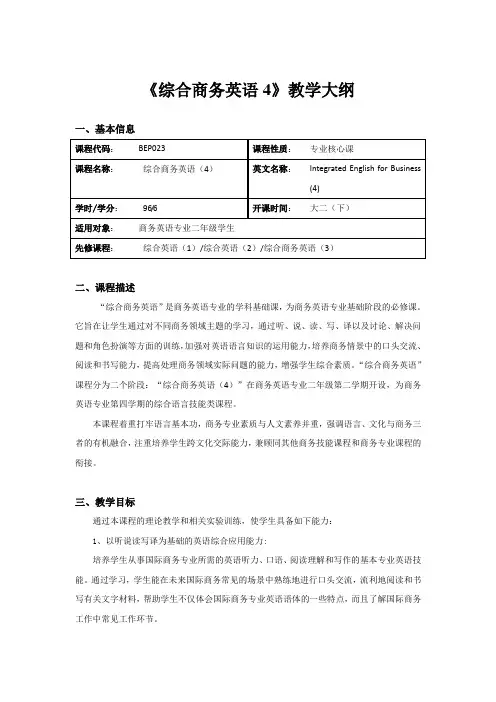
《综合商务英语4》教学大纲一、基本信息二、课程描述“综合商务英语”是商务英语专业的学科基础课,为商务英语专业基础阶段的必修课。
它旨在让学生通过对不同商务领域主题的学习,通过听、说、读、写、译以及讨论、解决问题和角色扮演等方面的训练,加强对英语语言知识的运用能力,培养商务情景中的口头交流、阅读和书写能力,提高处理商务领域实际问题的能力,增强学生综合素质。
“综合商务英语”课程分为二个阶段:“综合商务英语(4)”在商务英语专业二年级第二学期开设,为商务英语专业第四学期的综合语言技能类课程。
本课程着重打牢语言基本功,商务专业素质与人文素养并重,强调语言、文化与商务三者的有机融合,注重培养学生跨文化交际能力,兼顾同其他商务技能课程和商务专业课程的衔接。
三、教学目标通过本课程的理论教学和相关实验训练,使学生具备如下能力:1、以听说读写译为基础的英语综合应用能力:培养学生从事国际商务专业所需的英语听力、口语、阅读理解和写作的基本专业英语技能。
通过学习,学生能在未来国际商务常见的场景中熟练地进行口头交流,流利地阅读和书写有关文字材料,帮助学生不仅体会国际商务专业英语语体的一些特点,而且了解国际商务工作中常见工作环节。
2、培养和提升跨文化商务交际能力:a. 使学生具备在跨文化商务场合中进行语言及非语言交际的能力;了解并掌握解决实际跨文化商务问题所应具备的知识及技能(如商务会话、谈判、跨文化商务冲突处理等);提高跨文化交际意识;b. 掌握课文内容涉及到的经济、法律、商务、管理等领域的术语,拓展知识面;3、培养对时事的敏感度、批判性思维能力、解析与评论商务现象的能力,与时俱进。
四、课程目标对毕业要求的支撑五、教学内容第1章Media: Fact or Fable(支撑课程目标1, 2, 3)重点内容:mainstream media, elite media, mass media, media relations, new media难点内容:institutional structure of media, power play, textual analysis, writing styles教学内容:Reading: reading for general ideas, specific information, implied meaning, textual analysis Speaking: discussion, survey, presentation skillsListening: listening for the gist and listening for specific information, note-takingWriting: book reviewBusiness-oriented skills: case study, researchStudy skills: how to distinguish between argumentative and expository essays第2章Originality and Fair Play(支撑课程目标1, 2, 3)重点内容:Web 2.0, democratization, intellectual property, copyright for traditional cultural expressions难点内容:demerits of the latest web technology, survey report, quotation教学内容:Reading: reading for general ideas, specific information, implied meaning, critical thinking Listening: listening for the gist and listening for specific information, note-takingSpeaking: discussion, role-play, survey reportWriting: quoting effectively and avoiding plagiarismBusiness-oriented skills: case study, researchStudy skills: etymology第3章National Interest in a World Community(支撑课程目标1, 2b, 3)重点内容:Fortune 500, national prejudices, corporate social responsibility难点内容:cultural intelligence, textual analysis, case study教学内容:Reading: reading for general ideas, specific information, reading criticallyListening: listening for general ideasSpeaking: discussion, survey, presenting one’s own opinions, giving commentsWriting: choice of vocabulary: formality, certainty and strengthBusiness-oriented skills: cultural intelligence in multinational environmentStudy skills: use of indices第4章Who Wins the Lion’s Share(支撑课程目标1, 2, 3)重点内容:monopoly, antitrust, intervention, industrial policy难点内容:market competition models, antitrust regulators, survey教学内容:Reading: reading for general ideas, specific information, implied meaningListening: listening for the gist and listening for specific information, note-takingSpeaking: discussion, presentation skillsWriting: indirect speech and reporting verbsBusiness-oriented skills: case study, researchStudy skills: understanding argumentation by tracing cause-effect analysis第5章Conflict and Compromise (支撑课程目标1, 2, 3)重点内容:international trade, import, export, economics, currency难点内容:implications of protectionism, trade war, persuasion in speaking and writing 教学内容:Reading: reading for general ideas, specific information, implied meaningListening: listening for the gist and listening for specific information, note takingSpeaking: discussion, persuasion, presentation skillsWriting: how to persuadeBusiness-oriented skills: critical thinking, researchStudy skills: compound adjectives第6章Law and Order (支撑课程目标1, 2, 3)重点内容:economic sanction, embargo, boycott, restriction难点内容:controversies about economic sanction, summarization, use of corpus教学内容:Reading: reading for attitudesListening: listening for implied meaningSpeaking: making commentsWriting: ways to end a paragraphBusiness-oriented skills: case study, researchStudy skills: use of corpus六、教学安排该课程每周6学时,16周,48学时为课堂授课教学时间,48学时为课内实验教学时间。
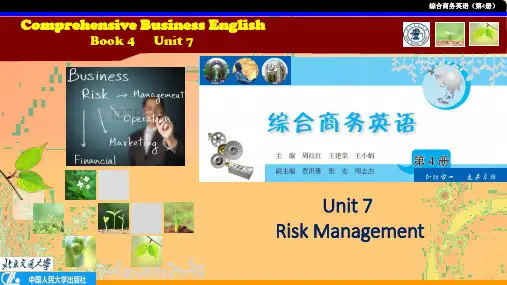
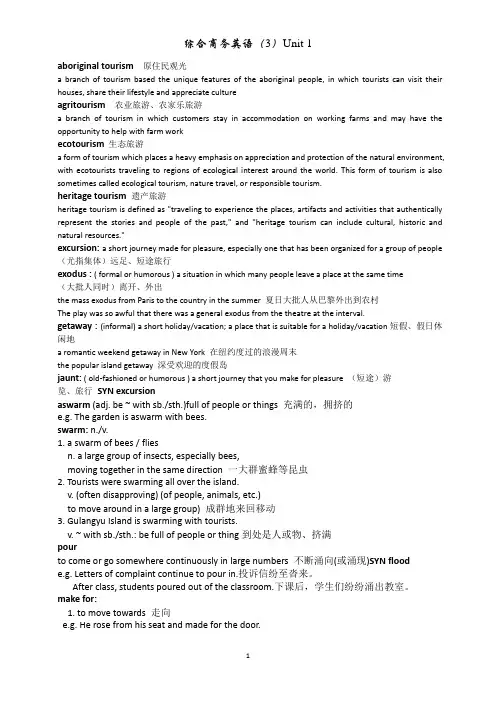
aboriginal tourism原住民观光a branch of tourism based the unique features of the aboriginal people, in which tourists can visit their houses, share their lifestyle and appreciate cultureagritourism 农业旅游、农家乐旅游a branch of tourism in which customers stay in accommodation on working farms and may have the opportunity to help with farm workecotourism生态旅游a form of tourism which places a heavy emphasis on appreciation and protection of the natural environment, with ecotourists traveling to regions of ecological interest around the world. This form of tourism is also sometimes called ecological tourism, nature travel, or responsible tourism.heritage tourism遗产旅游heritage tourism is defined as "traveling to experience the places, artifacts and activities that authentically represent the stories and people of the past," and "heritage tourism can include cultural, historic and natural resources."excursion:a short journey made for pleasure, especially one that has been organized for a group of people (尤指集体)远足、短途旅行exodus : ( formal or humorous ) a situation in which many people leave a place at the same time(大批人同时)离开、外出the mass exodus from Paris to the country in the summer 夏日大批人从巴黎外出到农村The play was so awful that there was a general exodus from the theatre at the interval.getaway : (informal) a short holiday/vacation; a place that is suitable for a holiday/vacation短假、假日休闲地a romantic weekend getaway in New York 在纽约度过的浪漫周末the popular island getaway 深受欢迎的度假岛jaunt: ( old-fashioned or humorous ) a short journey that you make for pleasure (短途)游览、旅行SYN excursionaswarm (adj. be ~ with sb./sth.)full of people or things 充满的,拥挤的e.g. The garden is aswarm with bees.swarm: n./v.1. a swarm of bees / fliesn. a large group of insects, especially bees,moving together in the same direction 一大群蜜蜂等昆虫2. Tourists were swarming all over the island.v. (often disapproving) (of people, animals, etc.)to move around in a large group) 成群地来回移动3. Gulangyu Island is swarming with tourists.v. ~ with sb./sth.: be full of people or thing到处是人或物、挤满pourto come or go somewhere continuously in large numbers 不断涌向(或涌现)SYN floode.g. Letters of complaint continue to pour in.投诉信纷至沓来。
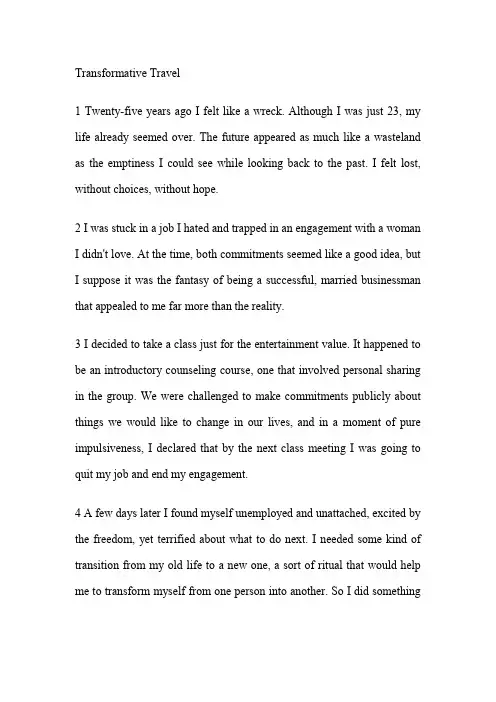
Transformative Travel1 Twenty-five years ago I felt like a wreck. Although I was just 23, my life already seemed over. The future appeared as much like a wasteland as the emptiness I could see while looking back to the past. I felt lost, without choices, without hope.2 I was stuck in a job I hated and trapped in an engagement with a womanI didn't love. At the time, both commitments seemed like a good idea, but I suppose it was the fantasy of being a successful, married businessman that appealed to me far more than the reality.3 I decided to take a class just for the entertainment value. It happened to be an introductory counseling course, one that involved personal sharing in the group. We were challenged to make commitments publicly about things we would like to change in our lives, and in a moment of pure impulsiveness, I declared that by the next class meeting I was going to quit my job and end my engagement.4 A few days later I found myself unemployed and unattached, excited by the freedom, yet terrified about what to do next. I needed some kind of transition from my old life to a new one, a sort of ritual that would help me to transform myself from one person into another. So I did somethingjust as impulsive as my previous actions: I booked a trip for a week in Aruba.5 In spite of what others might have thought, I was not running away from something but to something. I wanted a clean break, and I knew I needed to get away from my usual environment and influences so as to think clearly about where I was headed.6 Once settled into my room on the little island of Aruba, I began my process of self-change. I really could have been anywhere as long as nobody could reach me by phone and I had the peace and quiet to think about what I wanted to do. I spent the mornings going for long walks on the beach, the afternoons sitting under my favorite tree, reading books and listening to tapes. Probably most important of all, I forced myself to get out of my room and go to meet people. Ordinarily shy, I now decided that I was someone who was perfectly capable of having a conversation with anyone I chose. Since nobody knew the "real" me, the way I had always been, I felt free to be completely different.7 It took me almost a year to pay off that trip, but I am convinced that my single week in Aruba was worth three years in therapy. That trip started a number of processes that helped me to transform myself. This is how I did it:8 I created a mindset that made me ready for change. I expected that big things were on the horizon, that a trip such as this could change my life. I believed with all my heart that I could change, if only I could find a quiet place to sort things out and experiment with new ways of thinking and acting.9 I insulated myself from the usual influences in my life and the people whose approval was most important. One of the reasons that therapy often takes so long is that, once you leave the safety and support of a session, you reenter the world where familiar people elicit the familiar reactions. By separating myself from others' approval and influences, I was able to think more clearly about what I really wanted.10 I structured my time in order to produce change and growth. Solitude, isolation, or new environments in themselves are not enough; you must also complete tasks that are relaxing and educational. The most important part of any therapy is not what you understand or what you talk about, but what you do. Insight without action is entertaining but not always helpful. Instead of reading novels and calling home regularly, I took the time to participate in different activities that would make me change.11 I pushed myself to experiment with new ways of being. I sampled alternative lifestyles and pretended to be a different person. I acted in unfamiliar ways just to see how it felt. Whatever I would usually do invarious circumstances, I forced myself to do the opposite. This reinforced the idea that anything was possible, that I could do anything I wanted.12 I made public commitments of what I intended to do so it would be harder to back down. There were times when I wanted to avoid doing those things I found most frightening. Until this trip, I had never traveled to a strange place deliberately alone. Whenever I thought about taking safe routes, I imagined that I would soon have to face my classmates and that I would have to explain my actions to them.13 I processed my experiences systematically. I wrote in a journal each day and spoke to people I met about what I was doing and why. When I returned, I talked to several people I trusted about what had taken place. Each of them offered a different perspective that I valued and found useful in incorporating the experience into my life.14 I made changes when I returned that continued the transformation that started while I was in Aruba. It is easier to make changes when you are away from home than to maintain the changes after you return. To make sure I didn't slip back into old patterns, I immediately made new decisions about my work and my relationships that kept me moving forward.15 I decided that much of my future traveling would have some transformative dimension to it. Although it is possible to make extraordinary progress in a single week, transformative change takes place over a lifetime. I promised myself that I would make other trips from time to time in order to continue my growth.。
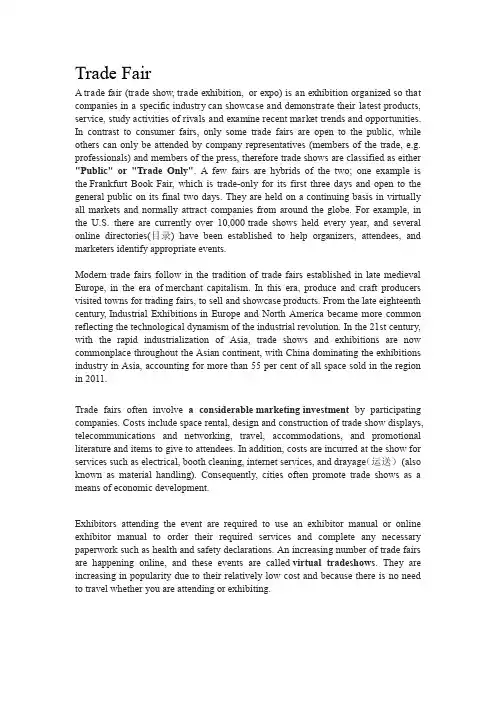
Trade FairA trade fair(trade show,trade exhibition,or expo) is an exhibition organized so that companies in a specific industry can showcase and demonstrate their latest products, service, study activities of rivals and examine recent market trends and opportunities. In contrast to consumer fairs, only some trade fairs are open to the public, while others can only be attended by company representatives (members of the trade, e.g. professionals) and members of the press, therefore trade shows are classified as either "Public" or "Trade Only". A few fairs are hybrids of the two; one example is the Frankfurt Book Fair, which is trade-only for its first three days and open to the general public on its final two days. They are held on a continuing basis in virtually all markets and normally attract companies from around the globe. For example, in the U.S. there are currently over 10,000trade shows held every year, and several online directories(目录) have been established to help organizers, attendees, and marketers identify appropriate events.Modern trade fairs follow in the tradition of trade fairs established in late medieval Europe, in the era of merchant capitalism. In this era, produce and craft producers visited towns for trading fairs, to sell and showcase products. From the late eighteenth century,Industrial Exhibitions in Europe and North America became more common reflecting the technological dynamism of the industrial revolution. In the 21st century, with the rapid industrialization of Asia, trade shows and exhibitions are now commonplace throughout the Asian continent, with China dominating the exhibitions industry in Asia, accounting for more than 55 per cent of all space sold in the region in 2011.Trade fairs often involve a considerable marketing investment by participating companies. Costs include space rental, design and construction of trade show displays, telecommunications and networking, travel, accommodations, and promotional literature and items to give to attendees. In addition, costs are incurred at the show for services such as electrical, booth cleaning, internet services, and drayage(运送)(also known as material handling). Consequently, cities often promote trade shows as a means of economic development.Exhibitors attending the event are required to use an exhibitor manual or online exhibitor manual to order their required services and complete any necessary paperwork such as health and safety declarations. An increasing number of trade fairs are happening online, and these events are called virtual tradeshows. They are increasing in popularity due to their relatively low cost and because there is no need to travel whether you are attending or exhibiting.。
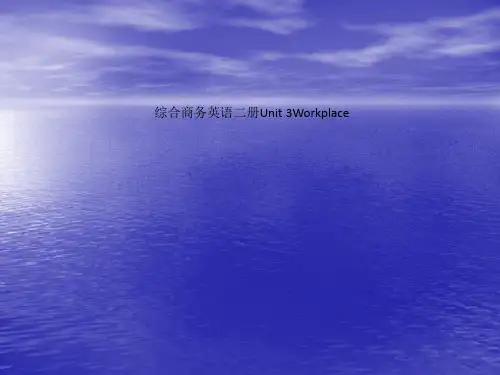
Unit Nine Internet and Our LifeLead-in1. Look at the caricatures and discuss with your partner(s) what advantages and / or disadvantages Internet search giants have brought to us. Advantages and / or disadvantages1 Advantage: People can get information easily and readily on Internet.Disadvantage: People will stop using their heads and will simply steal stuff from Internet.2 Disadvantage: People would just stay at home Googling, and quit outdooractivities. Too much Internet surfing will break up family relationship.3 Disadvantage: People become addicted to Internet Surfing and will get mentaland physical illness.4 Advantage: You can get any information instantly from Google, includingmedical advices.Disadvantage: Doctors and many other professionals will lose their jobs. 5 Disadvantage: Internet surfing could be dangerous and deceptive.6 Advantage: Information tech can speed up people‘s life so much that we canhardly keep pace with it. 2. Internet Addiction TestFinish the following test to find out how addicted you are to Internet. 10-24 points: You are an ave rage online user.25-39 points: You are experiencing occasional or frequent problems because of the Internet.40-50 points: Your Internet usage is causing significant problems in your life.Tips: Students may have few minutes‘ free discussion on the item. And then the teacher may ask s ome of them to report their test results and analyze if the given evaluation criteria are reliable or n ot. If not, what other factors should be considered too.Text AI.Reading Comprehension1. Multiple Choice: Choose the best answer to each question based on the information you get fro m the text. 1) D 2) A 3) C 4) B 5) A2. Essay Questions1) Google is now confronted with both internal and external challenges: The first external challenge involves placating regulators, who fret that it may be abusing its considerable power, and Google is now undergoing investigations conducted respectively by European Union and Texas‘s govern ment; the second one is how to find new sources of growth. So far, the company has been dependi ng only on search-related advertising for its revenue, which could be very dangerous and may lea d the company to collapse; thirdly, it is also being threatened by the newly arising online informati on forces such as Facebook and Apple; last but not least, the company is also seeing barriers in ma ss media, who are now thinking twice before licensing content to Google. As the company grows big, it is becoming more and more bureaucratic. Decision-making process becomes slower and inn ovations are always delayed. Some people in Googleplex complain that it is impossible to get thin gs done and Google has lost some of its star managers; some employees even reckon that Google i s going through ―a Darwinian evolution‖ that could make it harder to attract top talent in the future.2) Because it is difficult now for Google to find new sources of revenue and profit to replace those from its old products. Besides, Google‘s share price has stopped to rise. 3) It‘s too early to say tha t yet. Although the firm‘s revenue growth slowed from 56% in 2007 to 9% last year, it was still res pectable considering that the global economy fell howling off a cliff. And there are signs that the company is picking up steam again: Its third-quarter revenue rose by 23% to $7.3 billion, which be at most analysts‘ expectations.4) To achieve sustainable growth, Google has adopted many solutions: By acquiring several co mpanies to enlarge its business scope. By developing the mobile web services.By developing and applying new technology to mobile online services. By investing in othe r businesses, such as wind-energy project.II.Blank-fillingComplete the following sentences with the words given in the box. Change the form when necessa ry.1) flotation 2) conventional 3) unorthodox 4) fret 5) deride6) stagnate 7) caustically 8) made headlines 9) resonate 10) quirkyIII.Paraphrasing1. Rewriting: Rewrite the underlined part of each sentence in your own words. 1) Just during this year, Google has surprised the world by investing in a wind-energy project off the east coast of A merica and by testing self-driving cars.2) Google has been able to afford to make such extraordinary achievements thanks to its amazingl y successful online-search business.3) Google‘s business has spread into almost every corner of the web services, with a leg in everyth ing from online search and e-mail to social networking and web-based software applications, or ap ps.4) Much of its growth has been organic, but Google also has spent some money on purchasing oth er businesses.5) All this has turned Google into an important company that others can not neglect.2. Sentence transformation: Complete the following sentences based on the structures given.1) The new technology will increase considerably the total number of online searches if it is widel y accepted and becomes popular.2) The price that people rumored for the technology sounds a bit too high, but this price will bring in some fund that Google needs badly now to invest in the local search service, as it is weaker in t his field.3) Google launched Google Instant earlier this year which can strengthen Google‘s online search s ervice as it can display the search results before the users finish entering their requirements, which can save a few seconds from the previous search services.4) ―The advice I got from every McKinsey consultant is that I ‘m investing my money into too many businesses,‖ says Jonathan Rosenberg, Google ‘s head of product management.5) By acquiring small companies, Google has been able to purchase more businesses and strengthe n its skills and knowledge in those areas.IV.Translation1. Sentence Translation1) 在美国德克萨斯州,谷歌公司也面临着一项类似的调查,也在与一些网络旅游公司较量。
商务英语综合教程(3)复习资料整理(上册)Unit 41.2.Translate sentences(1)迈克自从决定与一位日本姑娘结婚在日本定居,就一直在刻苦地学日语。
Mike has been assiduous in learning Japanese since he decided to settle down in Japanafter he married a Japanese girl.(2)报纸对他发动了恶毒的攻击,逼迫他辞职。
The newspapers launched a vicious attack on him, forcing him to resign.(3)现阶段精心规划,就会避免事到临头慌乱惶恐。
Careful planning at his stage will help to avoid a last-minute panic.(4)这个谷仓被神奇地改造成了一家豪华酒店。
The barn has been miraculously transformed into a luxury hotel.(5)一种怀旧的气氛弥漫在整场演出中。
A restospective atmosphere pervaded the whole performance.3.Idioms(1)The film testifies to the courage of ordinary people during the war.(2)One of the report’s recommendations is for the creation of a new body to keepregulation in check over the long term.(3)I must be going home; it ’s way to my bedtime.(4)After all the delays, we were anxious to make up for lost time.(5)We have managed to get through some very tough times.(6)This is to help her to come to terms with her early upbringing and make sense of past experiences.(7)It’s not always possible to keep tabs on everyone’s movements.(8)It has made a remarkable profit, and is expected to notch up a million customers next year.(9)Pensions will be increased in line with inflation.(10)Organizing the school trip will be a lot of work, so I need some volunteers to help out .4.Translate the following passage into Chinese.Did you ever get a job offer, promotion or pay increase that brought you up another level in status and made you feel really good about yourself? But what happened a year later? You feel pretty much the same way you did before the big jump in pay. Your income was up but so were your expenses. You’re really not that much happier since you started making more.As people increase their income, their also increase their expectations and what they want out of life. We humans have a tendency to revert to a normative level of happiness even after undergoing major positive life changes.你是否有过这样的经历,找到工作,得到晋升,或加了工资,你的地位提升了,你对自己感觉好极了?但一年之后怎么样呢?你的感觉跟你收入大幅增加之前几乎一样。
《综合商务英语Ⅰ》课程教学大纲Course syllabus of Business English: An IntegratedCourse Ⅰ一、课程基本信息Course Information课程代码: 16068004Course Code: 16068004课程名称:综合商务英语ⅠCourse Name: Business English: An Integrated Course Ⅰ课程类别:专业必修课Course Type: Compulsory学时:60学时Course Period: 60 hours学分:4学分Course Credit: 4适用对象: 商务英语专业1年级学生Students: First year undergraduate考核方式:考试Assessment: Examination先修课程:无Preparatory Course: None2、课程简介Course Introduction综合商务英语Ⅰ是为商务英语专业学生开设的1门专业技能必修课。
课程所选教材《商务英语综合教程》(第二版)是我国商务英语专业第1套按商务英语专业教学要求编写的教材,由对外经济贸易大学和上海外语教育出版社共同编写。
商务英语综合教程强调语言、文化与商务3者的有机结合,整套教材分为4册,1-4册中的语言技能、商务知识、文化知识按比例合理分配,第1册中的分配比例为,语言70%,商务与文化30%。
《商务英语综合教程Ⅰ》共有8个单元,其中每个单元包括围绕1个话题的3篇课文和配套视频资料。
每个单元的大体结构如下:第1部分:准备(词汇、内容、知识),第2部分:课文Ⅰ(课文理解检查),第3部分:课文II(阅读理解练习、视听练习等),第4部分:课文III:(语言练习与小组作业),第5部分:语言训练(语言点、理解练习、学习技能、写作技能)。
The undergraduate course Integrated Business English prepares students to play an active and creative role in today’s globalized world by exploring English languageand Business across cultures. The course bookBusiness English: An Integrated Course Book 1 constructs 8 topics for the whole semester, each containing 3 articles with language skill practices and in class discussions.3、课程性质与教学目的综合商务英语是1门专业技能必修课,是为商务英语专业开设的1门基础阶段主干课程。
The Coming Trade Wars1The massive intrusion of government into national economics could spark disastrous protectionism.Jeffrey E. Garten It's hard to find a top economic official, economist or global business leader who doesn't recognize today's heightened dangers of protectionism. But it is equally difficult to identify any high-powered efforts to actively ward off the prospect of higher tariffs, quotas or trade-blocking regulations. It is as if talking about the threat is seen as enough to deter a gigantic rollback of global commerce. But rhetoric will not prevent a trade war, which is now, I believe, more likely than it has been at any time since the early 1970s, when currencies were no longer fixed to the value of gold and began to float against one another.A half-century of steady trade liberalization was in jeopardy even before the current financialand economic meltdown. Prior to the implosion of Bear Stearns①, the U.S. Congress had takenaway almost all of President Bush's trade-negotiating authority, feeling that the U.S. was no longer gaining enough from new trade agreements, while jobs were being lost and wages undercut. Wellbefore "subprime"②entered the popular lexicon,the Doha round of trade negotiations hadcollapsed, as rich and poor nations fought over contentious issues like agriculture. The rise of China and India has raised deep concerns over import penetration, not just in the U.S. and Europe but also in emerging markets like Mexico. For a few years now, prominent economists were raising warning flags that support for free trade was being eroded by the perception that trade was contributing to ever-greater income inequalities.Now, however, the collapse of the global banking system, a deepening global recession and the massive intrusion of governments into national economies—a trend that can't help but politicize economic policy decisions—have all added fuel to the fire. Unemployment is growing, with more than 70,000 layoffs announced in the U.S. and Europe last Monday alone, and global trade volume is now decreasing—by more than 2 percent, according to the World Bank—for the first time in a quarter century. Container ships sit idle in ports—demand is down 50 percent year on year. America's own exports declined 6 percent last year, China's 9 percent and Japan's a shocking 35 percent. Trade financing, the essential lubricant of the entire commercial system, has dried up. Slow growth has meant massive industrial overcapacity in heavy industries such as steel, automobiles and electronics, and with global manufacturing dropping at an annual rate of 20 percent, the situation will get much worse. To be sure, we have yet to see a major outbreak of protectionism. Unlike crises in finance, trade problems are slow to emerge, but once the momentum begins, the trend takes years to reverse.Meanwhile, there are straws in the wind. In the first half of 2008, antidumping investigations around the world were up at least 30 percent. In December, Washington expanded existing sanctions against selected EU food products in retaliation for Europe's boycott of American hormone-treatedbeef③, an old dispute to be sure, but one that is being escalated. Brazil and Argentina are exertingpressure on members of Mercosur, the South American trade block, to raise the group's external 1Adapted from Newsweek, Feb 9, 2009. URL: /id/182539tariff. And because the WTO's permissible limits on tariffs level are often much higher than the actual tariffs that countries have imposed in recent years, it is all too possible that governments will now raise tariffs and still be within their legal limits—a blow to trade, whatever the law says. Just last December, after the G20 called on members to resist protection in this troubled times, India raised tariffs on steel, iron and soybeans, and four other governments in the group gave notice that they too were planning to raise tariffs. In the next few weeks, the Obama administration will be deciding whether to file a large suit in the WTO against China's subsidization of exports, potentially upping global trade tensions by orders of magnitude.But the most dangerous trade conflicts may stem not from wrangling over traditional subsidies or tariffs, but from the new fiscal stimulus plans being launched around the world to counter the economic downturn. In recent months, politicians have been encouraging consumers to, in the words of the Spanish industry minister Miguel Sebastian, "buy patriotically." Now as one country after another enacts major stimulus packages, they are sure to attempt to limit government procurement to domestic producers. The current U.S. House of Representatives version of the $825 billion stimulus bill, for example, is already riddled with "Buy America" legislation mandating that the money or subsidies go exclusively to U.S. makers of steel, cement, etc.Beyond that, the efforts of many governments to bail out entire industries risk taking on a protectionist tone. Washington is again a case in point as it spends billions to rescue Detroit's Big Three, with not a penny going to Toyota or BMW, both of which are hurting from the downturn and both of which are gigantic investors in the U.S. and employers of tens of thousand of Americans. Another looming problem could concern the aircraft industry, as just last week the Frenchgovernment decided to subsidize financing for Airbus④ not just with normal export financing butwith money heretofore reserved for rescuing banks. How long before Washington and Boeing follow suit?In the stimulus and bailout cases, this kind of discrimination between "domestic" and "foreign" companies is exactly what trade negotiations since 1947 have tried to combat. Foreign investment is the lifeline for many nations, and distinctions between foreign and domestic firms are increasingly blurred. Complex global supply chains crisscross the world, making discrimination on the basis of nationality a throwback to another age and a monkey wrench in the machinery of modern global commerce.Another palpable protectionist threat is the possibility of competitive currency devaluations. The problem could be particularly acute among Asian countries, which collectively rely on exports for more than 40 percent of their GDP.Since the 1950s, the U.S. has led the charge for dismantling global trade barriers. Yet, during the recent presidential election, then candidate Barack Obama seemed ambivalent about this legacy,with his call to renegotiate NAFTA⑤and his almost blanket support for the policies of theprotectionist labor unions. Now, with trade tensions sure to rise, the president must change his tune and become a global leader.***If there is a serious deterioration of global commerce due to protectionism, the damage would include slower growth everywhere. It would be impossible to restructure large global industries such as auto and steel, and there would be major difficulties further integrating India, Brazil, Russia andothers into the global economy—with an attendant rise of political confrontations.The banking crisis combined with deteriorating growth could deal a body blow to globalization.A trade war would be the coup de grâce.(Total Words: 1262)Notes to the Text①Bear Stearns: A global investment bank and securities trading and brokerage, which collapsedas a prelude to the risk management meltdown of the Wall Street investment bank industry in September 2008, and the subsequent global financial crisis and recession.②Subprime crisis: Subprime lending is a type of loan that is offered at a rate above prime toindividuals who cannot qualify for prime rate loans, as their low credit ratings or other factors suggest that they have a reasonable chance of defaulting on the debt repayment. In order to compensate for the higher credit risk, subprime loans tend to have a higher interest rate than the prime rate offered on traditional loans.③Hormone-treated beef: In the 1990s, in the midst of the mad cow disease crisis, the EuropeanUnion banned the import of meat that contained artificial beef hormones. WTO rules permit such bans, but only where a signatory presents valid scientific evidence that the ban is a health and safety measure. Canada and the United States opposed this ban, taking the EU to the WTO Dispute Settlement Body.④Airbus: Airbus is the world’s leading aircraft manufacturer which produces more than half of theworld’s jet liners. Airbus employs around 52,000 people at sixteen sites in four European Union countries: France, Germany, the United Kingdom and Spain. Final assembly production is at Toulouse (France), Hamburg (Germany), Seville (Spain) and, since 2009, Tianjin (China).⑤NAFTA: Implementation of the North American Free Trade Agreement (NAFTA) began onJanuary 1, 1994. This agreement will remove most barriers to trade and investment among the United States, Canada, and Mexico.New Words and Expressionstariff /ˈtærɪf/ n. a tax that is paid on goods coming into or going out of a country 关税quota /ˈkwəʊtə/ n. a limited quantity of a particular product which under official controls can be produced, exported, or imported(产品生产或进出口的)限额,定额implosion /ɪm'pləʊʒn/ n. (figurative) sudden economic or political collapse(喻)(经济或政治)突然崩溃undercut /ˌʌndəˈkʌt/ v. to sell goods or services at a lower price than your competitors廉价出售subprime /ˌsʌb'praɪm/ adj. denoting or relating to credit or loan arrangements for borrowers with a poor credit history, typically having unfavorable conditions such as high interest rates次级的,次贷的(指借款者因信用记录不良而在贷款时经常面临高利率等不利因素)lexicon /ˈleksɪkən/ n. the vocabulary of a person, language, or branch of knowledge(个人、语言或学科的)词汇contentious /kənˈtenʃəs/ adj. likely to cause disagreement between people有争议的lubricant /ˈlu:brɪkənt/ n. a substance, for example oil, that you put on surfaces or parts of a machine so that they move easily and smoothly润滑剂retaliation /rɪˌtæliˈeɪʃn/ n. action that a person takes against sb who has harmed them in some way 报复,报仇escalate /ˈeskəleɪt/ v. to become or make sth greater, worse, more serious, etc. 升级subsidization /ˌsʌbsɪdaɪ'zeɪʃn/ n. the action of a country or public body assisting an industry or business so that the price of a commodity or service may remain low or competitive财政补贴,津贴loom /lu:m/ v. to appear important or threatening and likely to happen soon迫近heretofore /ˌhɪətuˈfɔ:(r)/ adv. (formal) before this timelifeline /'laɪflaɪn/ n. something that is very important for sb and that they depend on生命线throwback /ˈθrəʊbæk/ n. a person or thing that is similar to sb/sth that existed in the past大倒退monkey wrench / ˈmʌŋki rentʃ/ n. (informal) an activity to sabotage sth(口语)破坏性因素palpable /ˈpælpəbl/ adj. that is easily noticed by the mind or the senses可触知的,明显的devaluation /ˌdi:ˌvæljʊ'eɪʃn/ n. the reduce of the official value (of a currency) in relation to other currencies(货币)贬值dismantle /dɪsˈmæntl/ v. to end an organization or system gradually in an organized way分解,废除deterioration /dɪˌtɪərɪə'reɪʃn/ n. the process of becoming progressively worse恶化,不断变坏。